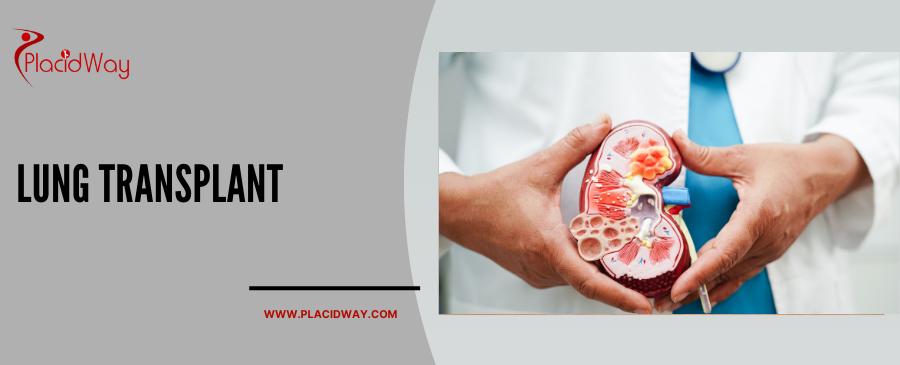
Table of Content
Key Insights at a Glance
- Lung transplant replaces diseased or failing lungs with healthy lungs from a donor.
- Treatment abroad may offer access to experienced transplant surgeons and reduced wait times.
- International transplant centers often provide personalized pre- and post-operative care for optimal recovery.
What is a Lung Transplant?
A lung transplant is a complex surgical procedure in which one or both diseased lungs are replaced with a healthy lung or lungs from a deceased donor. This procedure is typically considered when other treatments have failed for patients with severe lung conditions like chronic obstructive pulmonary disease (COPD), cystic fibrosis, or pulmonary fibrosis. Lung transplants are often the last resort for restoring respiratory function and improving quality of life.
Symptoms Indicating Need for Lung Transplant
- Severe shortness of breath, even at rest
- Frequent lung infections or pneumonias
- Persistent chest tightness and difficulty breathing
- Oxygen dependency
- Reduced quality of life due to limited lung function
Latest Solutions for Lung Transplant Worldwide
| Treatment Type | Description |
|---|---|
| Single Lung Transplant | Replacement of one diseased lung, often sufficient for some conditions. |
| Double Lung Transplant | Both lungs are replaced, common for conditions that affect both lungs equally. |
| Lung-Heart Transplant | Combined heart and lung transplant, generally for patients with severe heart and lung disease. |
To explore different packages for lung transplant, click here.
Safety Concerns for Lung Transplant Abroad
- Ensure that the clinic is certified for organ transplants and follows strict protocols.
- Verify the experience and qualifications of the transplant surgical team.
- Evaluate the quality of post-operative care, including ICU facilities and rehabilitation support.
Benefits of Lung Transplant Abroad
- Reduced waiting time for transplant, especially in countries with efficient donor programs
- Cost savings compared to the U.S. and Western Europe
- Access to advanced post-operative care and rehabilitation services
Risks Associated with Lung Transplant Globally
- Risk of organ rejection, requiring lifelong immunosuppressive therapy
- Increased susceptibility to infections due to immunosuppression
- Possible surgical complications, such as bleeding or blood clots
- Extended recovery time with continuous medical monitoring
Procedure for Lung Transplant
The lung transplant process includes the following steps:
- Evaluation: Comprehensive medical assessments to determine eligibility for transplant.
- Waiting List: Patients are added to a transplant list if eligible, and matched with donors based on several criteria.
- Surgery: The surgical procedure may take several hours and involves removing the diseased lung(s) and replacing them with the donor lung(s).
- Recovery: Initial ICU care, followed by months of monitoring and rehabilitation.
Cost of Lung Transplant in the World | Compare Prices
| Country | Average Cost (USD) |
|---|---|
| Mexico | $70,000 |
| Turkey | $85,000 |
| Thailand | $80,000 |
| Colombia | $75,000 |
| India | $65,000 |
| Austria | $120,000 |
Find Prices for Lung Transplant Near You: click here.
FAQs Related to Lung Transplant Overseas
What does a lung transplant cost without insurance?
Without insurance, a lung transplant can cost over $150,000 in the United States. Many patients seek options abroad, where costs are typically lower, ranging from $65,000 to $120,000, depending on the country and clinic.
How long does recovery take after a lung transplant?
Recovery from a lung transplant can take several months. Patients initially stay in the ICU, followed by continuous outpatient monitoring and a structured rehabilitation program to regain respiratory function and overall health.
Is lung transplant surgery abroad safe?
Yes, provided the surgery is performed in an accredited facility with experienced transplant surgeons. International clinics specializing in transplants adhere to global standards, ensuring safe procedures and high-quality post-operative care.
What are the common side effects after a lung transplant?
Common side effects include shortness of breath, fatigue, and an increased risk of infections. Long-term effects of immunosuppressive drugs may include kidney issues, which are managed through regular monitoring and medication adjustments.
Can I travel immediately after a lung transplant abroad?
Patients are typically advised to remain in the host country for several weeks post-surgery for follow-up care. Travel restrictions may vary, and it’s essential to consult your surgeon for guidelines specific to your recovery status.
Book Your Lung Transplant Abroad Today with PlacidWay
Choosing lung transplant surgery abroad can offer access to high-quality, affordable care with shorter wait times. PlacidWay connects you with top-rated transplant centers worldwide, ensuring access to expert medical teams and comprehensive post-surgery support. Begin yo
Best Organ Transplant Center | Cheap Organ Transplant Packages









Share this listing